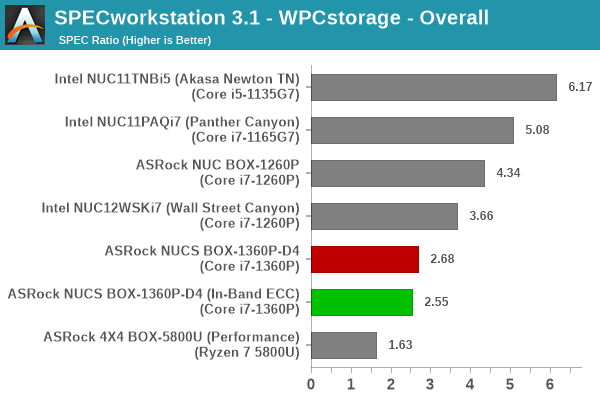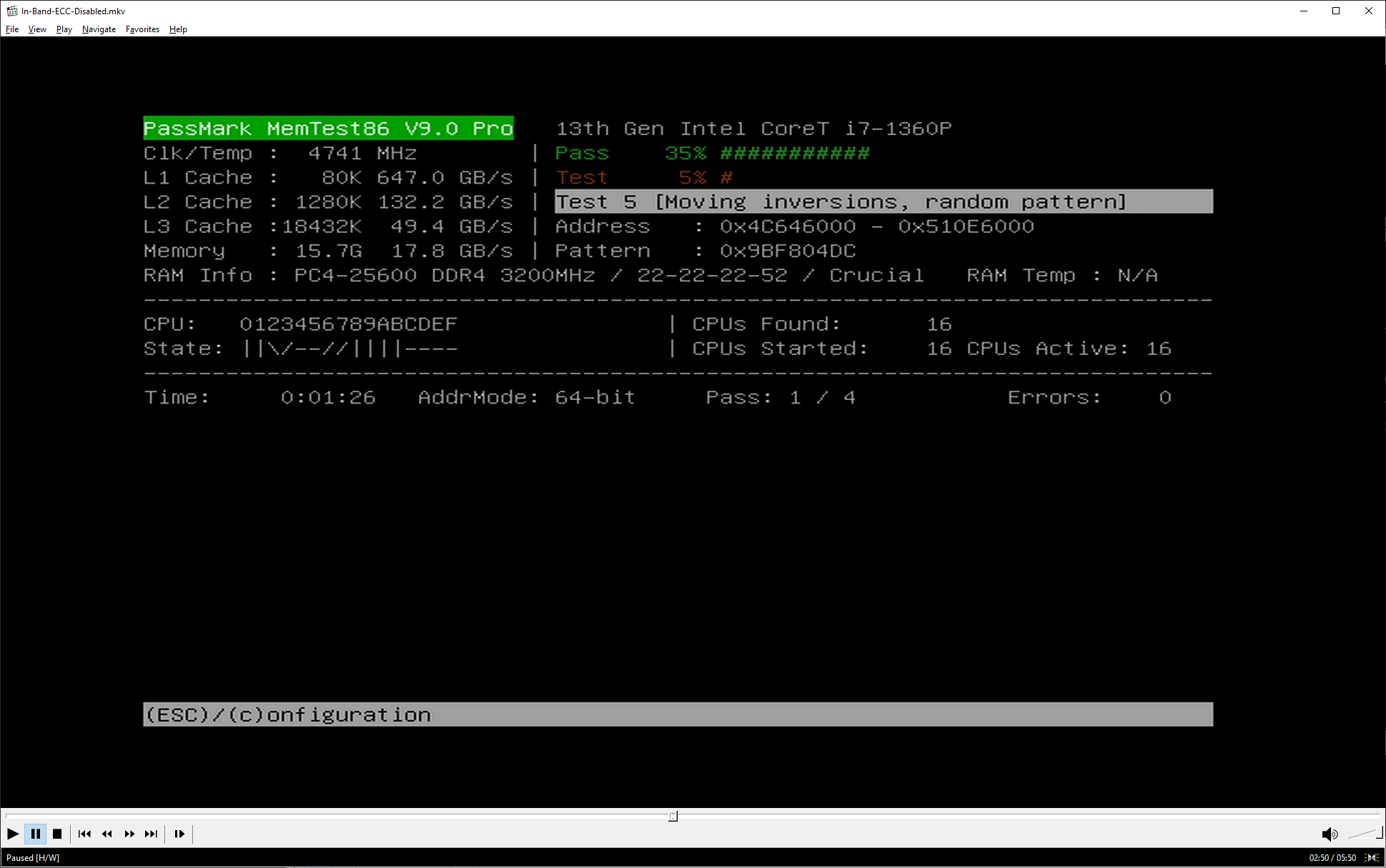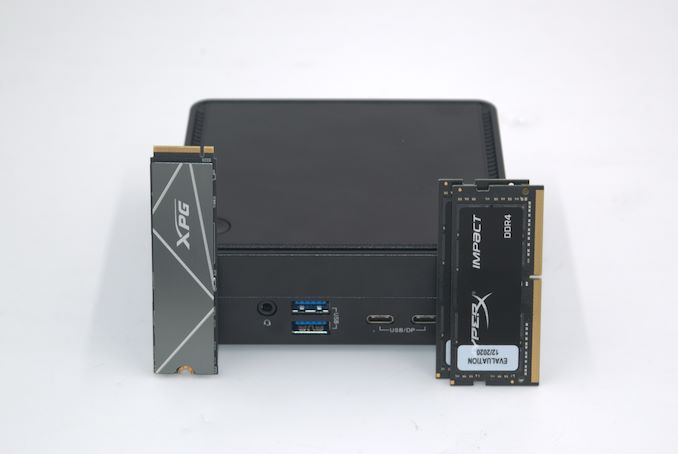ASRock Industrial NUCS BOX-1360P/D4 Review: Raptor Lake-P Impresses, plus Surprise ECC
by Ganesh T S on January 29, 2023 9:30 AM EST- Posted in
- Systems
- NUC
- UCFF
- Mini-PC
- ASRock Industrial
- Raptor Lake-P
Miscellaneous Aspects and Concluding Remarks
Networking and storage are aspects that may be of vital importance in specific PC use-cases. The ASRock NUCS BOX-1360P/D4 comes with the Wi-Fi 6E AX210 WLAN card that also include Bluetooth 5.2 support. On the wired front, we have a 2.5 Gbps port backed by the Intel I226-LM controller. A dual LAN option in this form-factor would have been nice to have, but consumers needing that can always go in for the full-height NUC BOX-1360P/D4. Strangely, the vPro support available in the NUC BOX-1260P seems to be absent here.
On the storage side, the NUCS BOX-1360P does have support for a PCIe 4.0 x4 NVMe SSDs (and we used one in our configuration). However, cooling those within the space constraints imposed by the form-factor of the slim NUC is very challenging, as we saw in the SSD temperature graph in the previous section. In the absence of an effective thermal solution, it might be a better option to stick with a PCIe 3.0 x4 NVMe SSD for this unit. From a benchmarking perspective, we provide results from the WPCstorage test of SPECworkstation 3.1. This benchmark replays access traces from various programs used in different verticals and compares the score against the one obtained with a 2017 SanDisk 512GB SATA SSD in the SPECworkstation 3.1 reference system.
| SPECworkstation 3.1.0 - WPCstorage SPEC Ratio Scores | |||

The graphs above present results for different verticals, as grouped by SPECworkstation 3.1. The storage workload consists of 60 subtests. Access traces from CFD solvers and programs such as Catia, Creo, and Soidworks come under 'Product Development'. Storage access traces from the NAMD and LAMMPS molecular dynamics simulator are under the 'Life Sciences' category. 'General Operations' includes access traces from 7-Zip and Mozilla programs. The 'Energy' category replays traces from the energy-02 SPECviewperf workload. The 'Media and Entertainment' vertical includes Handbrake, Maya, and 3dsmax. The gulf between the same SSD in the NUC BOX-1260P and the NUCS BOX-1360P would have been surprising if not for the fact that the new form-factor lacks airflow and cooling support for the SSD.
In pursuit of more investigation into the in-band ECC feature, I dug up one of the DDR4 SODIMMs that I had junked earlier for failing MemTest. Placing that in the system and running MemTest again on it delivered interesting results based on the chosen in-band ECC option. The following screenshots are from the display output recorded via a HDMI capture card - the timestamps in the video capture are to be noted.
| PassMark MemTest Processing on Faulty SODIMM | |||

With the default settings (in-band ECC turned off), the memory test reports failure in due course. On the other hand, with in-band ECC activated, MemTest ends up hanging - most likely after encountering the first memory error (before the testing program can get access to the faulty read data, the memory / ECC handling controller has detected uncorrectable errors and triggered an interrupt - which MemTest is probably unable to handle).
It appears that the in-band ECC has been present since Tiger Lake in a variety of processors. While its availability in the embedded processors line is clearly advertised on ark (example), its presence in the desktop (12th Gen. / 13th Gen.) and mobile (PDF) product line is buried under layers of documentation and not advertised widely. The murky aspect here is that error correction with standard DRAM is specified to be supported only in Chrome systems. It is not clear what is specific to Chrome (and not available or implementable in Windows and Linux) that enables it to take advantage of the in-band ECC feature. This is perhaps something worthy of follow-up by the open-source community, as the feature is of considerable interest to NAS operating systems.
Closing Thoughts
The ASRock NUCS BOX-1360P/D4 provided us with the opportunity to evaluate one of the first end products based on Intel's latest Raptor Lake-P platform. The product fulfills all our basic expectations from ASRock Industrial - we have seen that their UCFF systems run in a stable manner and provide good performance without much of an attempt at overall power consumption optimization. That trend continues with the NUCS BOX-1360P/D4. This approach has allowed ASRock Industrial to attract early adopters, and at the same time also target use-cases where the idle power consumption aspect is not much of a concern. The NUCS BOX-1360P/D4 is a worthy upgrade to the NUC BOX-1260P in terms of performance. On the I/O front, the trifurcation of the product line by ASRock Industrial has resulted in the need to wait for the other NUC BOX-1300 models if dual LAN and USB 3.2 Gen 2x2 capabilities are desired. Compared to their previous UCFF systems, the NUCS BOX-1300 series has a reduced height, and this does affect the thermal situation of the M.2 SSD. Hopefully, ASRock Industrial can address this with a solution similar to the one employed by Intel in their slim NUC kits.
Intel's Raptor Lake-P is quite close to Alder Lake-P architecturally. The core counts, cache sizes, and heterogeneous combinations are pretty much equivalent. Under such circumstances, it is indeed surprising that just process advancements have enabled Raptor Lake-P to provide satisfactory improvements in performance as well as power efficiency over Alder Lake-P. We are able to reach this conclusion despite evaluating a system that has not yet been optimized for power based on the energy consumption numbers for key UCFF PC workloads. A comparison of the power consumption profile of the NUC BOX-1260P and the equivalent Wall Street Canyon NUC shows that ASRock Industrial leaves plenty on the table for further optimization.
The expected generational improvements aside, it is heartening to see in-band ECC support getting more visibility. The ability to improve upon memory integrity without having to spring for special types of RAM or additional board area / traces can be a major selling point in a variety of consumer applications also. We are hopeful that Intel will not restrict it to industrial and embedded SKUs alone. On Raptor Lake-P specifically, we hope Intel will help enable it on operating systems beyond just Chrome OS. Obviously, there is no free lunch, and we do see some loss in performance for specific workloads (such as ones involving heavy iGPU activity). In situations requiring memory protection, the delta is not big enough to be a deal-breaker.
ASRock Industrial plans to market the NUCS BOX-1360P/D4 at a price point similar to the NUC BOX-1260P - $700 (Update: USD 691 at launch on February 7, 2023). Given the performance improvements over the previous generation NUC BOX-1260P as well as other UCFF systems, and the new features enabled in Raptor Lake-P, the pricing is justified. We look forward to the company optimizing the BIOS to address the idle power consumption issue, and tag on an appropriate thermal solution for the M.2 SSD. Those minor quibbles aside, the product is on completely solid ground in terms of both price and performance.











30 Comments
View All Comments
mode_13h - Tuesday, February 14, 2023 - link
I also don't agree that W680 boards are scarce. At least Supermicro boards seemed to be easy enough to find since the end of last year. Now DDR5 ECC UDIMMs have been a much bigger challenge, but they're thankfully now readily available too.mode_13h - Tuesday, February 7, 2023 - link
Thanks for the review, but my ideal microserver would be fanless and support a 2.5" SATA SSD. Does anyone know if any of their fanless boxes support in-band ECC? I couldn't find any indication that they do.https://www.asrockind.com/en-gb/fanless-embedded-b...
ganeshts - Wednesday, February 8, 2023 - link
ASRock Industrial took notice of your comment and requested that this be posted in response.mode_13h - Thursday, February 9, 2023 - link
Thanks for the follow-up!Now, if I could just find an ASRock Rack X570D4U-2L2T Mini-ATX board in stock somewhere in the US. I can never seem to find it or the newer /BCM version.
mode_13h - Monday, February 27, 2023 - link
Just wanted to follow up on the ASRock Rack X570D4U-2L2T. It's finally back in stock @ newegg! Shipped & sold by newegg, too (i.e. not just some scalper).For those not familiar with this product, it's a micro-ATX AM4 server board with dual 10G Ethernet, ECC RAM support, and remote management via BMC. I'm excited, because there are no other products like it, to my knowledge. ASRock Rack has validated ECC memory on it, which you tend to see on other AM4 boards. You can find professional reviews of it, on other sites.
I'm about to order mine, now.
mode_13h - Monday, February 27, 2023 - link
Sorry, I meant to say that I _haven't_ seen ECC memory fully validated and supported, on other AM4 boards. This is one of the preferred boards of the homebrew NAS community.sjkpublic@gmail.com - Monday, February 13, 2023 - link
Nice NUC. But I am waiting on the 7735U.sjkpublic@gmail.com - Monday, February 13, 2023 - link
$690 barebones.sjkpublic@gmail.com - Monday, February 13, 2023 - link
Silly people posting on ECC for a end user desktop/kiosk device - trying to put a square peg in a round hole. I like the idealistic attitude. But the realistic says otherwise.sjkpublic@gmail.com - Tuesday, February 14, 2023 - link
Silly me! I retract. ECC support is a great idea.